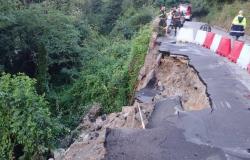
In the first months of the year in Perugia there was a centre-right that had already chosen its candidate – Margherita Scoccia, Fratelli d’Italia, outgoing councilor for urban planning, candidate to succeed Andrea Romizi in the name of continuity – and a centre-left which was consumed in a fratricidal fight. Every name of a possible mayoral candidate was burned in a few hours: “It happened like this with Paolo Belardi, then with Serse Cosmi. In the morning the name was mentioned, in the afternoon someone got angry. It seemed like a campaign lost from the start”, recalls a politician that comes from that area. Then, in February, the turning point. From the left – “a civic left, which looks at society”, who doesn’t want the project to be associated with an overly radical left – came the name of Vittoria Ferdinandi. A psychologist who grew up in the footsteps of the writer Clara Sereni, she was the director of the restaurant run by people with psychiatric illnesses, born from an idea of La città del Sole, the foundation created by Sereni.
While Scoccia was appointed to lead a now well-established centre-right project, Ferdinandi found herself building a very broad alliance within the centre-left. A sort of very broad field of Abruzzo memory. Whoever built it, however, perhaps mindful of the Luciano D’Amico defeat, doesn’t want to hear about a “very wide field”. “It’s an alliance of people – those who followed the genesis of the candidacy tell us – and in any case we achieved a miracle”. What would be miraculous would be to have managed to bring together Avs – which, with Elisabetta Piccolotti at the head, pushed hard on Ferdinandi’s name – and Action, the Democratic Party and the 5 Star Movement and even a piece of Italia Viva.
And so the centre-right which – after ten years of administration having begun the fall of Perugia was the first of a long series, shortly thereafter many Umbrian cities would move from left to right – felt it had the wind in its sails had to change its mind. And now he is aware of a challenge that will be at the last vote. This is an awareness that is also shared by those who support Ferdinandi. “Such a high level of participation in an electoral campaign hasn’t been seen for a long time”, a long-time friend of the centre-left candidate tells us.
The mobilization is strong among those coming from the civic world, but also among the parties. “Vittoria Ferdinandi was able to revive a broad, political and social centre-left,” Walter Verini, Democratic Party senator elected in Umbria, tells HuffPost. When HuffPost reaches him by phone he is leaving Rome for Umbria, he has five electoral initiatives on his agenda. Ferdinandi, adds Verini, “has restored unity and hope to the city after ten years of inaction, kind but still inaction, five years of terrible regional government and after the disappointments that the national government is causing. Precisely for this reason he will be able to lead Perugia with vision and daily concreteness”.
Concreteness which, according to the centre-right, the left-wing candidate lacks. The city centre-right claims to have set up a campaign on the issues. The highlight of Scoccia’s electoral outings was the list of activities implemented by the outgoing administration and some projects in the pipeline. The biggest clashes have been over mobility: with the centre-right sponsoring the metrobus project which the left doesn’t like. Scoccia, then, during the election campaign spoke of the master plan – “there will be one after 2026”, say his people – and of a project to renovate the roads. Proposals that have raised some questions. For the series: “You have governed for 10 years, why haven’t you already done so?”. Scoccia defended herself against these accusations by claiming that she is only talking about them now because she did not want to give the idea of a mere electoral promise. From her entourage, however, they remember the budget hole they found in 2014, left by the center-left, and which has been closed in these ten years.
In the city, multiple sources tell us, there is a lively air. And the squares filled by Ferdinandi worry a centre-right who, however, appears bold: “We are a coalition – is the mantra – on their part there is only ideology”. However, those who have followed the birth of Ferdinandi’s project since, during the first electoral initiative in which the guest of honor was Damiano Tommasi, mayor of Verona, the auditorium was so full that people remained outside , tells of a work born from the bottom. And of a program of over 110 pages built with the coalition, but also with the citizens, with the neighborhoods. In these ten years of opposition, the local center-left has had a lot of time to criticize itself. And he understood that he started to lose when he distanced himself from the citizens. From this awareness a reconstruction project began.
Such excitement hasn’t been felt in the capital of Umbria for years. In that city known for Umbria Jazz and for the University of Foreigners, a secular city but so close to Franciscanism, in which Aldo Capitini gave life to the peace march and in which a worker managed to become president of the Region, now look at the outcome of the polls. There are those who bet that there will not be a run-off, but it is more likely that there will be a second round. Between Scoccia and Ferdinandi, between Margherita and Vittoria, two women so different in history and ideas. The former knows that without the latter she would have won hands down. The second, now, hopes for the feat. “Vittoria – adds her friend – responded with a smile to the rude attacks of those who went to fish for photos of her when she, very young, was experiencing moments of conviviality, just to discredit her”. A few days ago an article by Massimo Gandolfini was published in La Verità accusing Ferdinandi of wanting “gender indoctrination at school”. Where would he have deduced this thesis from? From a passage in the program which talks about inclusion and “raising awareness of the pluralism of family realities in schools”. For Ferdinandi, inclusion is a value. For his detractors – national, rather than local – a danger worth avoiding.





